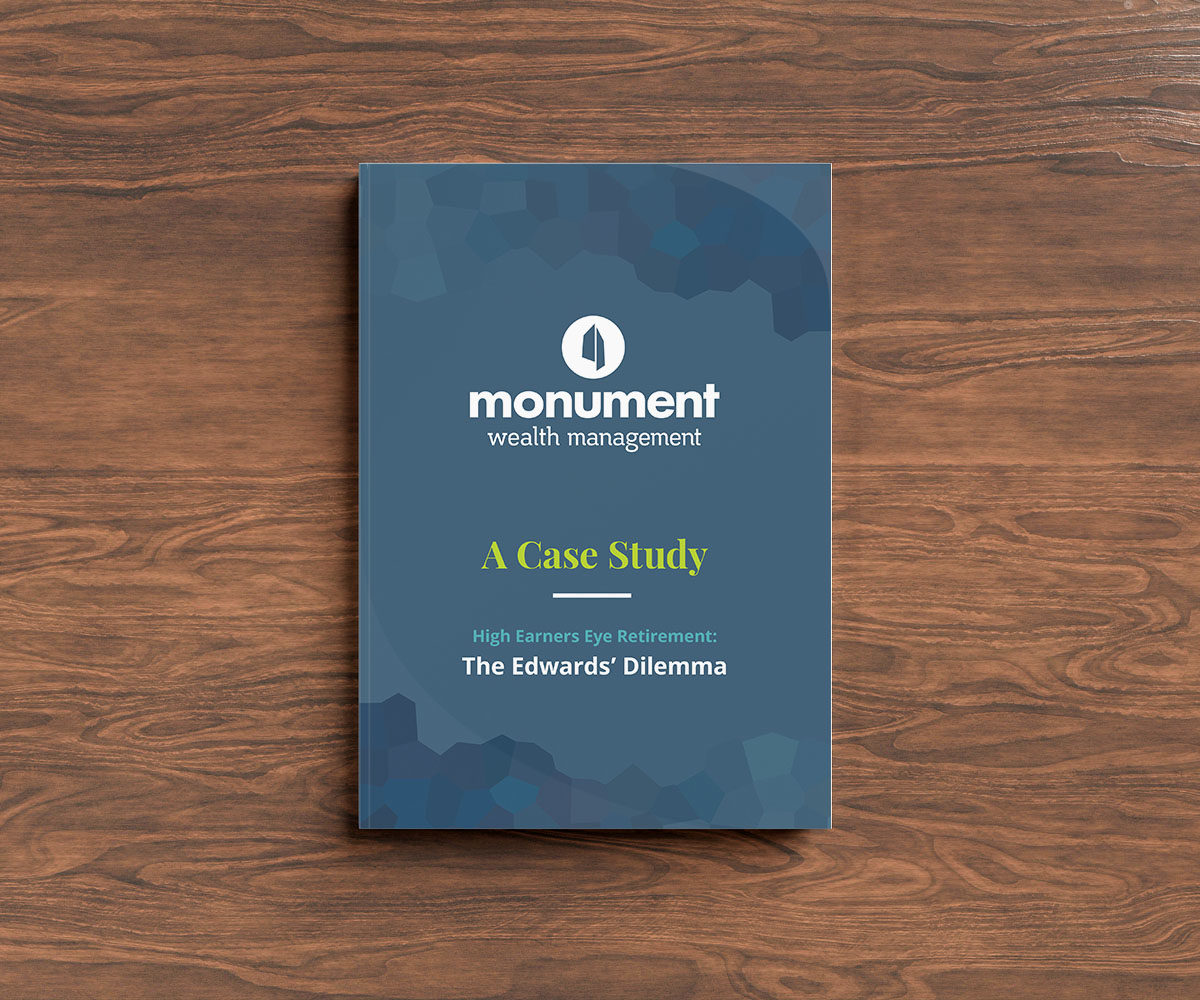Monument Wealth Management Articles
10 Things All Investors Should Know

Share on your favorite platform, or by email
At Monument, we’re tired of financial advisors spewing out jargon and B.S. to the public in an attempt to look smart, sell something, or over-complicate wealth management when people are simply seeking clarity.
Here are real, unfiltered opinions of what we believe all investors should be thinking about right now:
1. Your own behavior determines your success more than any other factor, in every area of your life—including finances.
Unless you’re trying to become rich overnight, the day-to-day of wealth management shouldn’t be causing you a spike in adrenaline or a dark spiral into despair—or worse, a series of fear-based decisions and reactive behaviors that cause you to get in your own way, and obstruct the path to wealth.
Look at the market the way you do a weather report—good to know so you can adjust your attire and travel plans as necessary, but it doesn’t have the power to derail your day or undo all your decisions.
2. Serious investing is not for your entertainment.
We’ve seen a lot of portfolios over the past decade and have noticed that what a lot of people think is investing, is not. We often see some combination of speculating, gambling and collecting. Just because investing can be entertaining and full of action, does not mean this is where you should seek those thrills.
A lot of financial salespeople use the excitement of investing to pitch a sale. We see this as morally corrupt because when you are enticed to gamble and take unnecessary risks with your portfolio, you are literally risking your future life. Gambling is best saved for a fun trip to Vegas with a limit on how much you could lose. Never confuse investing with entertainment and action.
3. There is no place for fear or greed in your investment plan.
Did you call your advisor in October of 2008 to say you were thinking of selling or investing? How about in November of 2007? Can you recall your emotions in December of 2018?
Most investors, especially those without a complete and Private Wealth Design, make the same mistake over and over again—they buy high in the face of greed or FOMO, the fear of missing out, and/or they sell low in the face of fear.
Our opinion is that it’s best to base investment decisions on your immediate need for cash and your retirement time horizon, which are components of a complete Private Wealth Design. Designing your wealth strategy while exercising patience and discipline are key components to successfully meeting your personal goals and objectives. Always know, “What’s the money for?” and never base your decisions on any fear or greed you may feel.

What is a Private Wealth Design?
Your Private Wealth Design is a collaborative, creative, customized approach to turning a wealth of opinions, ideas, resources, and investments into a blueprint that represents the life you want to live. It takes into consideration the big picture. Your Private Wealth Design is a living blueprint and action plan for your life, financial and otherwise, that changes, evolves, and adapts to your shifting needs and wants. That also means it’s not done the moment you create it; it’s an ongoing process that we continuously revisit, adapt, and adjust to suit your own life and goals as they evolve.
4. Don’t try to get even.
“Mental anchoring,” which is waiting for an investment to “get back to even” before selling it, is not a healthy investing behavior. We have heard it a million times: “As soon as it comes back up to where I bought it, I’ll dump it.” This mental anchoring can be a big mistake.
As they say in military planning, “Hope is not a course of action” and there is no assurance that it will ever recover. And there is opportunity cost associated with holding on for a recovery…and it’s missing out on investments that are better and increasing in value. If you start with $100,000 in a stock and it goes down $10,000, you should be agnostic over which security gets you back to even. In fact, there is a good argument to be made in taxable accounts to take the loss, buy a new security to get you back to even, and write off the $10,000 on your taxes against future capital gains.
Stick to the investment strategy and Investment Policy Statement that are part of any Private Wealth Design and seek advice from an advisor who is well-versed in a wide variety of economic considerations and financial analysis.
5. Overconfidence can be dangerous.
75% of all drivers think they are better than the average driver. It’s called “overconfidence” and it’s a problem…mostly because people rarely stop to think about how it affects them. Overconfidence is a major issue when investing, because you become more willing to take on higher risk with your investments and your overall strategy.
Solid long-term strategies are key to avoiding mistakes due to overconfidence. Bull markets, such as the 10 years following the 2008 crisis, can lead to overconfidence. It’s important to be award of this very powerful emotion and understand that solid long-term strategies are key to avoiding mistakes dues to overconfidence.
6. Watch out for conflicts of interest.
Recognize that big Wall Street firms are in the business of, among other things, selling products to investors. Sales awards such as “Chairman’s Club” are a key indicator of the sales culture seen in the large firms. Remember that these firms have a responsibility to their shareholders…NOT THEIR CLIENTS! The pressure these firms put on their advisors to grow revenue is immense and can create powerful misalignments, so understand that the advice you get from their salespeople may not always be in your best interest.
The best advice for any investor is to keep asking questions about conflicts, fees, hidden charges, commissions and other incentives—just as you’ve always had to.
7. Never trust past performance.
Pay attention to the saying, “Past performance does not guarantee future results.” Reputable studies can easily be found online showing that investments which have outperformed their peers in the past generally do not outperform them in the future. It’s also illogical to assume that past performance can be used as any sort of reliable indicator for the future. Strong past performance is often a matter of chance and timing, especially over the shorter term.
The best two things to keep in mind here are to avoid trying to outsmart the market and to lower the chances of making a decision that could have a catastrophic result (for example, over-concentrating a portfolio in one company).
8. Higher yield typically goes hand in hand with higher risk.
If you want a higher yield, you are probably going to take on more risk. Remember the old adage, “There is no free lunch on Wall Street.” As with any investment, the higher the expected return, the higher the risk.
For example, if a stock pays out an annual cash dividend of 8% but the stock decreases in value by 10% over that year, you have a negative return. This does not mean that all stocks with high dividends are bad investments; it simply means you are taking on more risk. As with all things, moderation and awareness are key.
9. Always align your capital and expectations with your goals.
At Monument, we believe that your goals are the pillars of your Private Wealth Design, which in turn should drive your investment strategy. Period. We strongly caution against buying investments from anyone who does not have in-depth knowledge of your Private Wealth Design. A common example of this is insurance salespeople trying to sell insurance as an investment without fully understanding the insurable interest (if any) outlined in a Private Wealth Design.
Our opinion is that you can make good financial decisions only within the context of your goals, which are unique to you and you alone. Someone else’s portfolio, built for their specific goals, may not be the right fit for you. Remember, performance is relative…and we believe that performance should be benchmarked against the performance needed to achieve a Private Wealth Design’s calculated probability of success.
Anyone can say they want their portfolio to “make more”, but if that’s their metric for measuring the success of their portfolio, they will never feel secure…or satisfied. Beating the S&P 500 is not a real measure of success and in fact could raise your risk profile well beyond what is needed to achieve your goals.
To look at it another way, when driving down the highway, faster is not always better. If you have an appointment 65 miles away and you need to be there in an hour, 65mph works. Going 85mph doesn’t do anything except increase your chances for getting a ticket or into an accident. Find the right speed and set the cruise control—that’s what a Private Wealth Design should provide you.
10. Invest to create something of meaning and purpose.
Your wealth and potential for growth is much more than the sum of its parts. The point isn’t just to have it and watch it ride the market like a roller coaster, wondering what will happen. The point is to create something of meaning and purpose. That said, ask yourself these three questions:
-
If you had unlimited money forever, how would you live your life?
-
If you found out you will die suddenly eight years from today, would you change your current life? How?
-
If you died tomorrow morning at 7:00am, what would you regret?
![]()
Did these opinions resonate with you? If so, here’s what you should consider
doing next.
The only way to make sure you are considering all these essentials and more is to sit down with a Private Wealth Advisor who knows how to listen, talk in plain language about your finances, and help you co-create a plan to achieve your goals.
![]()
About Monument Wealth Management
Most wealth advisors try to differentiate themselves by claiming they have the best–the best firm, the best plans, the best portfolio strategy, the best client service — we say that’s all a bunch of bunk.
These are all basic elements of being an advisor.
While we take great pride in our ability to execute on those basic elements, we know that’s not what really differentiates us. What differentiates us in a sea of sameness is our razor-sharp, innovative, collaborative, and creative team who delivers wealth-building expertise in a straightforward manner – without the egos.
When you work with Monument, you are working with our whole team – not just a single advisor.
We provide opportunities for business professionals and high-net-worth investors to use what they have, to get where they most want to go—and tap not just their potential for wealth, but their potential for living.

It’s time to find clarity around your finances and remove the anxiety of the unknown.
Read our case study, “High Earners Eye Retirement,” to see how we helped one of our clients with their wealth planning.
Ready for straightforward, unfiltered opinion and tailored advice for YOUR
questions, not everyone else’s?
IMPORTANT DISCLOSURE INFORMATION
Please remember that past performance is no guarantee of future results. Different types of investments involve varying degrees of risk, and there can be no assurance that the future performance of any specific investment, investment strategy, or product (including the investments and/or investment strategies recommended or undertaken by Monument Capital Management, LLC [“Monument”]), or any non-investment related content, made reference to directly or indirectly in this blog will be profitable, equal any corresponding indicated historical performance level(s), be suitable for your portfolio or individual situation, or prove successful. Due to various factors, including changing market conditions and/or applicable laws, the content may no longer be reflective of current opinions or positions. Moreover, you should not assume that any discussion or information contained in this blog serves as the receipt of, or as a substitute for, personalized investment advice from Monument. To the extent that a reader has any questions regarding the applicability of any specific issue discussed above to his/her individual situation, he/she is encouraged to consult with the professional advisor of his/her choosing. No amount of prior experience or success should be construed that a certain level of results or satisfaction will be achieved if Monument is engaged, or continues to be engaged, to provide investment advisory services. Monument is neither a law firm nor a certified public accounting firm and no portion of the blog content should be construed as legal or accounting advice.
A copy of Monument’s current written disclosure Brochure discussing our advisory services and fees is available for review upon request or at www.monumentwealthmanagement.com/disclosures. Please Note: Monument does not make any representations or warranties as to the accuracy, timeliness, suitability, completeness, or relevance of any information prepared by any unaffiliated third party, whether linked to Monument’s website or blog or incorporated herein, and takes no responsibility for any such content. All such information is provided solely for convenience purposes only and all users thereof should be guided accordingly.
Historical performance results for investment indices, benchmarks, and/or categories have been provided for general informational/comparison purposes only, and generally do not reflect the deduction of transaction and/or custodial charges, the deduction of an investment management fee, nor the impact of taxes, the incurrence of which would have the effect of decreasing historical performance results. It should not be assumed that your Monument account holdings correspond directly to any comparative indices or categories. Please Also Note: (1) performance results do not reflect the impact of taxes; (2) comparative benchmarks/indices may be more or less volatile than your Monument accounts; and, (3) a description of each comparative benchmark/index is available upon request.
Please Remember: If you are a Monument client, please contact Monument, in writing, if there are any changes in your personal/financial situation or investment objectives for the purpose of reviewing/evaluating/revising our previous recommendations and/or services, or if you would like to impose, add, or to modify any reasonable restrictions to our investment advisory services. Unless, and until, you notify us, in writing, to the contrary, we shall continue to provide services as we do currently. Please Also Remember to advise us if you have not been receiving account statements (at least quarterly) from the account custodian.